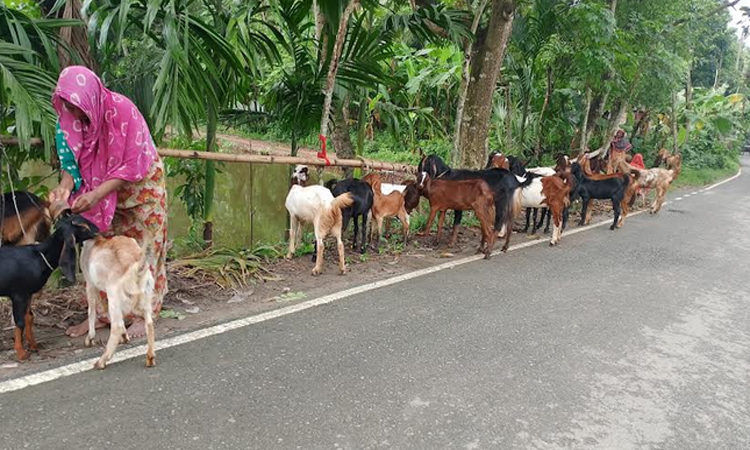News Flash

By Md Aynal Haque
RAJSHAHI, May 6, 2025 (BSS) - Goat rearing along with fattening have emerged as powerful tools for poverty alleviation and self-reliance in Rajshahi, particularly among marginalized and rural families.
With over 150 commercial goat farms and an estimated 5.5 lakh goats raised, the sector has transformed livelihoods across the region, including the Barind Tract. The government also supports this through modernization of public goat farms, including one in Rajshahi.
In the lead-up to Eid-ul-Adha, around 525,000 goats were fattened across homes and farms-an increase of 100,000 from the previous year-highlighting the rapid growth of this thriving industry.
According to District Livestock Officer Dr. Atoar Rahman, seven public goat farms across the country, including one in Rajshahi, have been modernized with improved facilities such as upgraded offices, staff accommodations, godowns, composting units, and water systems.
Dr. Atoar said they are working to establish demonstration farms, build skilled manpower and raise public awareness. Farmers are also receiving quality goats from government-run development farms at the upazila level.
He said there is an immense prospect of rearing and fattening goats. There are more than 100 goat-fattening farms in the district and the farming families have reared two-five goats in their homes.
The Rajshahi Goat Development Farm at Rajabari in Godagari Upazila is spearheading efforts to promote Black Bengal goat farming. The initiative emphasizes women's empowerment, sustainable livestock development, and improved biosecurity measures.
Palli Karma Sahayak Foundation (PKSF), a state-owned anti-poverty organization, has been extending financial and technical support to farmers in association with various non-government development organizations, including Sataful Bangladesh (SB).
Sohel Rana and Rima Khatun, a graduate couple from Daulatpur village in Bagmara upazila, turned to goat farming at their home after struggling to find government jobs.
Around three years back, they found a goat-fattening farm adjacent to their home.
This year alone, they invested around Tk 2 lakh in 40 goat kids, sold eight for Tk 1.80 lakh, and expect the remaining to fetch around Tk 4.50 lakh.
"Many rural families are earning substantial profits through goat rearing and fattening," said Sohel Rana. "It's become a sustainable livelihood."
In addition to commercial farms, many villagers are rearing goats in traditional ways in homesteads, using natural feed such as straw, molasses, oilcake, black gram, green grass and wheat bran-eschewing harmful steroids.
SB Executive Director Nazim Uddin Mollah said they are providing financial and technical assistance to village-level entrepreneurs towards establishing goat farms and many of the beneficiaries have become self-reliant.
Professor Jalal Sarder from Rajshahi University's Department of Veterinary and Animal Sciences noted that the Black Bengal goat is one of the top five meat-producing breeds globally. Known for its high reproduction rate, premium-quality leather and suitability for local climates, the breed is playing a critical role in protein supply and economic upliftment.
Prof Jalal said that villagers are now seen fattening goats using natural feeds such as straw, molasses, oilcakes, black gram, green grass, and wheat bran, avoiding harmful steroid tablets or injections.
To expand this potential sector, Prof Jalal called for wider dissemination of modern farming technologies, training on improved breeding practices and the establishment of more demonstration farms.
He stressed the need for skilled manpower and awareness programs on scientific goat rearing.
He, however, said substantial and sustainable boosting of the rearing of goats, including the Black Bengal, has been playing a vital role in meeting the protein demand along with promoting income generation and improving the lives of rural people.